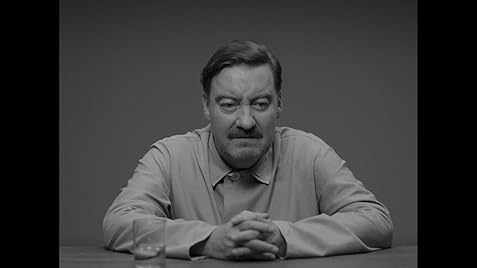Submit your Screenplay to the Festival TODAY
Director:
Writers:
Andrey Konchalovskiy (screenplay), Elena Kiseleva (screenplay)
Shot in black and white in part documentary style with interviews, PARADISE is a harrowing if not compelling study of human behaviour and strife for a better lifestyle (or as the film unfolds, the goal is to achieve a kind of PARADISE) regardless of circumstances. The circumstances in the film’s setting are not too good – as the setting is a Nazi concentration camp.
When the film opens, the audience sees three different individuals interviewed, whose paths cross because of the devastation of war.
The first person interviewed is a portly middle-class Frenchman named Jules who has a wife and a son called Emile.. He goes on to talk about his son being called Emile for no real reason, except to show that he is a man dedicated to family. Director Konchalovsky (who has proven himself with 3 well-known films, RUNAWAY TRAIN, THE ODYSSEY, SHY PEOPLE) allows his audience to form their own opinion or judgement on this not entirely unlikeable character as in the other two, despite him being a French-Nazi collaborator.
Next is handsome high-ranking German SS officer Helmut, who once fell madly in love with Olga and still harbours feelings. They re-kindle their old flame and embark on a twisted and destructive relationship.
The third and most important in the story is Olga. Olga, a Russian aristocratic immigrant and member of the French Resistance, is arrested by Nazi police for hiding Jewish children during a surprise raid. As her punishment, she is sent to jail where she meets Jules and later Helmut who offers her a safe haven to South America as an escape both for her from the concentration camp and for him from the defeat of the Nazis in the war.
The best thing about PARADISE is the film’s authentic look in terms of period and atmosphere. Everything else too from the costumes, wardrobe, sets look directly as if they were derived from old photographs. The camera moves in and out the seemingly crowded spaces in the concentration camp.
Konchalovsky also shows the rift between the Jewish prisoners. They fight among themselves for food and for the attire off someone who has just died. The kapos (the prisoners selected to act as guards) are also looked down upon in the film. Besides the grim look of the camps, Konchalovsky also shows the splendour enjoyed by the rich. Servants stand by to serve the rich and fortunate as they play tennis in the latest fashioned attire. Helmut looks particular sexy in his outfits among the females.
But the film’s main goal is the message that is revealed only at the end of the film – on how humanity and kindness can still exist amidst the futility of war. The film’s theme can be summarized using the famous words of German philosopher Karl Jaspers: “That which has happened is a warning. It must be continually remembered. It was possible for this to happen, and it remains possible for it to happen again at any minute. Only in knowledge can it be prevented.”
PARADISE arrives though a year late, with all the accolades after winning the Silver Lion Award at the Venice Film Festival. Definitely a film worth seeing!


Reblogged this on WILDsound Writing and Film Festival Review.
LikeLike